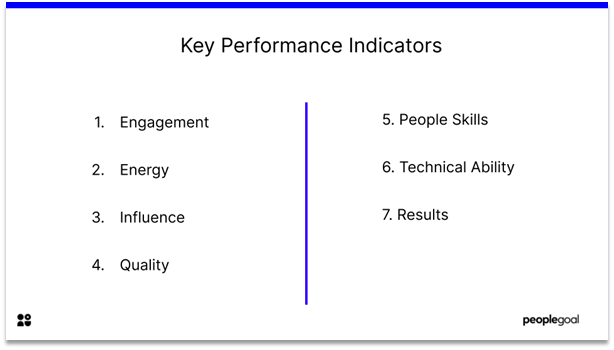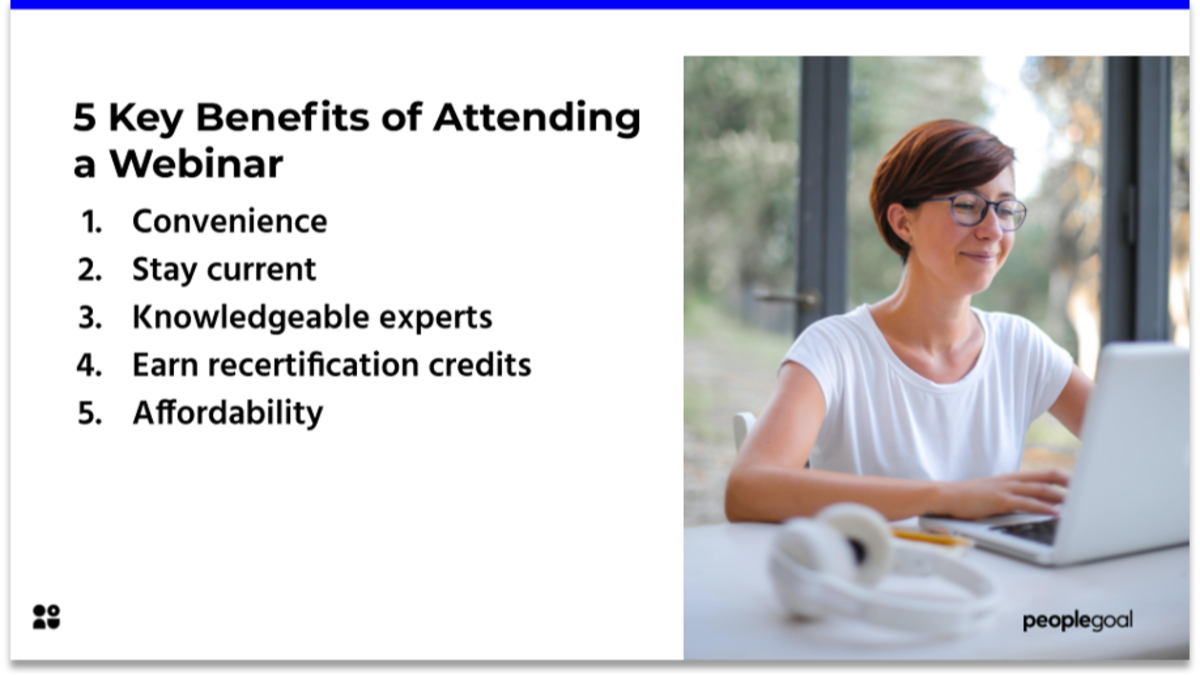Hiring for a management role is a major step for any business. You’re bringing on a long-term strategic partner who’ll have an impact on many different aspects of the business, not just within their own team. Management turnover is extremely costly, both financially and for team motivation and employee productivity.
To get the most out of your job interviews, prepare your manager interview questions in advance and make sure to consult with the key stakeholders the new hire will be accountable to. Ensure you have read every candidate’s CV and reference letters to ask specific questions concerning their experience. We’ve got 20 manager interview questions for you to use, as well as tips for the interviewer and a list of what qualities to look out for.
Behavioral Manager Interview Questions
Behavioral interview questions are used to learn more about your candidate’s work experience, their personality and how they will approach the management role. From their background and experience you’re seeing whether they’ll be a good fit for your organization, and have the attitude and approach you’re looking for.
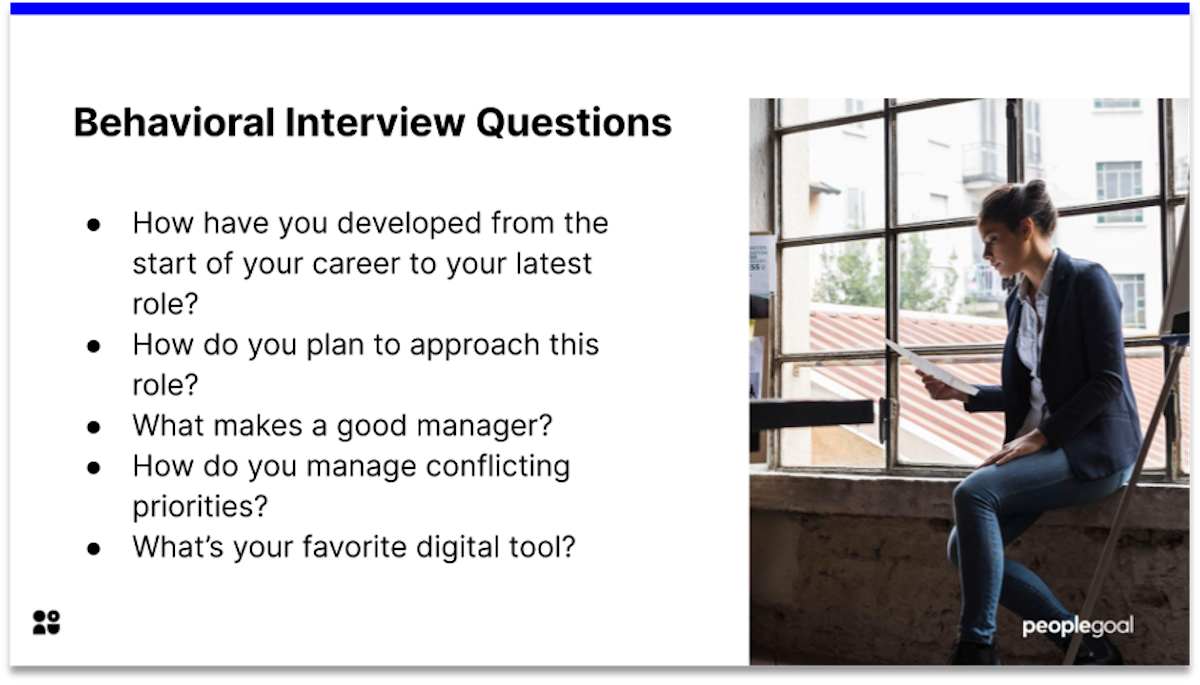
1. How have you developed from the start of your career to your latest role?
This should be an easy question to set the stage and get your candidate comfortable with talking about their background. It’s a more open-ended way of asking, “What are your strengths and weaknesses?”, and lets you dig into more details about their knowledge and experience.
2. How do you plan to approach this role, and what’s different about this to your current role?
In answering this question, you’re assessing what your candidate wants to bring to the company and whether they have experience in building out a good team. Explain the deliverables and expectations you have for the role and see how they plan to achieve these.
3. What do you think makes a good manager?
Asking this question should help you to learn whether your candidate will be a good cultural fit for your company and the team they’re going to lead. Instead of asking what kind of manager they are (or think they are!) you’re asking about their knowledge and attitude. There are many different management styles, and hiring the wrong type of manager for the team will be a massive drain on productivity and morale.
4. How do you manage conflicting priorities?
Managers juggle many responsibilities and it’s important that they know how to prioritize, delegate and problem-solve while keeping the bigger picture and strategy top of mind. Someone who gets flustered under pressure and has a “fire-fighting” approach isn’t going to be able to successfully lead their team through busy and stressful times.
5. What’s your favorite digital tool to use at work?
There’s no right or wrong answer to this question; what you’re really looking for is their ease with technology in general. Is your candidate organized, flexible, open with communication and quick to learn?
Competency Manager Interview Questions
Competency-based interview questions look at the leadership skills that every good manager needs. Successful managers need to be adept with communication, problem-solving, motivation, creativity, flexibility and conflict-resolution.
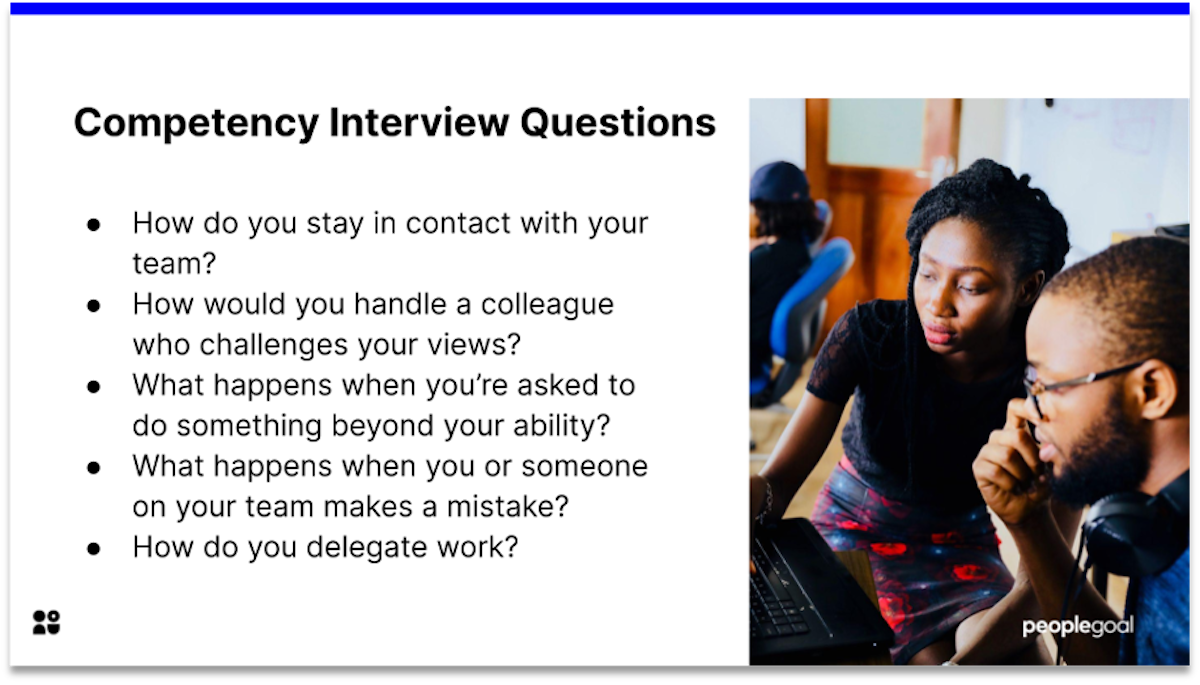
6. How do you stay in contact with your team?
While you’re of course looking at how this person prefers to communicate, you’re also assessing a crucial management competency – flexibility. With most office workers still working remotely, and many teams setting up a permanent structure of mixed remote- and in-office-work, the manager’s communication style needs to be adaptable to the team, their working style and the business’s ways of working.
7. How would you handle a colleague who continually challenges your views?
This scenario assesses emotional intelligence and conflict resolution. Can your candidate put themselves in someone else’s shoes, especially when that person is hostile? Can they exert their authority without undermining their colleague, and show a sense of diplomacy?
8. What happens when you’re asked to do something that’s beyond your ability?
Nobody has all the answers, and as a manager you’ll often be put in situations where you need to stretch yourself while supporting your team at the same time. This question looks at core competencies like problem-solving, creativity and innovation, as well as your candidate’s appetite for self-development.
9. What happens when one of your team makes a mistake? What about when you make a mistake?
Mistakes happen! What’s important is how we manage and resolve our mistakes. Honesty and integrity are fundamental qualities of a good leader. You’re also looking for someone who gives their team room to fail without fear – setting a team culture of being too afraid to try something new will kill innovation.
10. How do you delegate work and ensure that the work is completed?
A good manager will know how to delegate work appropriately, while remaining responsible for the overall delivery. Good team management is vital to productivity. Look out for signs of micro-management – does this person require constant status updates that create work for work’s sake, or do they trust their team and give them autonomy to complete the work to the best of their ability?
People Development Manager Interview Questions
Managing, mentoring, and motivating a team is what a management role is all about. When talking about People Development, you’re looking at your candidate’s natural ability to lead, to motivate, and to get the best out of each individual team member.
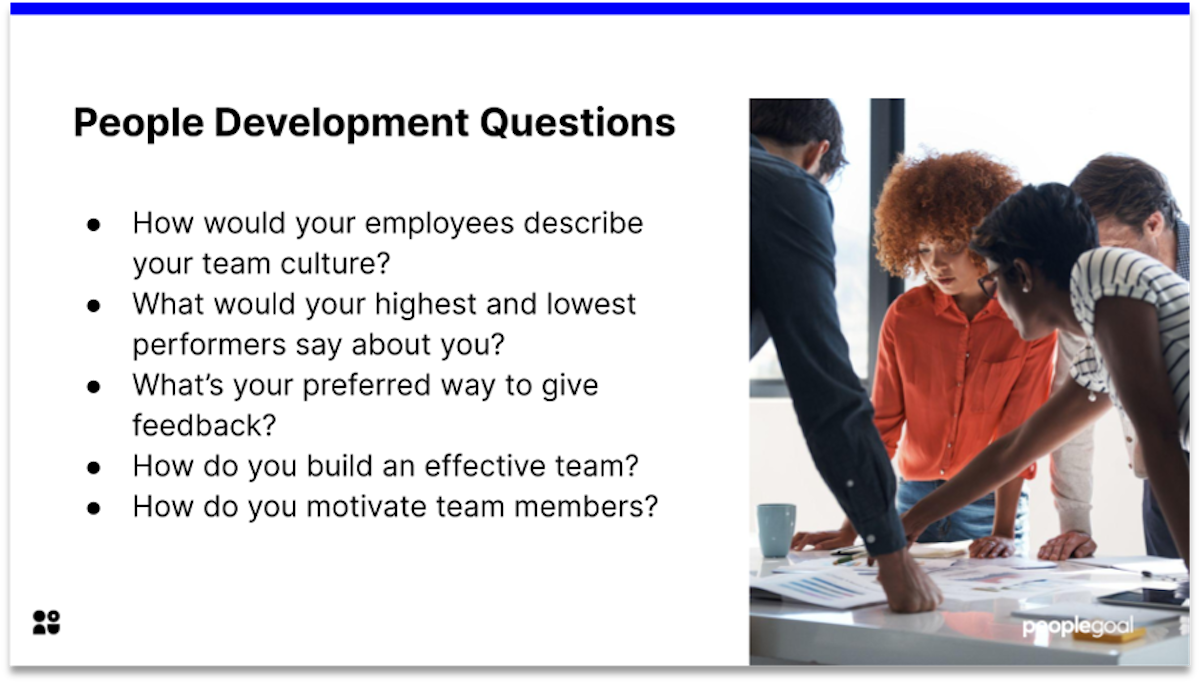
11. How would your employees describe the culture in your team?
At a basic level, is this person aware of their team dynamics? This question is another way to find out what kind of management style they prefer, and if that matches with what you’re looking for. Look out for someone who values coaching and development.
12. What would your highest- and lowest-performing employees say about you?
You’re looking for another realistic response in answering this question, not just hearing that the manager is well-liked. Sometimes your candidate simply gets along with their high performers; their personalities and work styles are a good fit and the team’s good results are not as a result of effective management. Similarly, low-performers might like their manager because their performance isn’t addressed and they aren’t pushed to improve.
13. What’s your preferred way to give feedback?
Being willing to have difficult conversations is absolutely crucial to being an effective manager. Someone who values feedback – both positive and negative – and prioritizes performance conversations is a manager who cares about their team and developing their skills.
14. What’s your plan for building an effective team?
Good leaders need to know how to tailor their performance rewards and motivators to each individual team member. It requires knowing what makes their team tick, and having a good understanding of development and motivation principles. Someone who takes a one-size-fits-all approach to team development is going to alienate some team members.
15. How do you motivate a low-performing team member? What about a top performer who is becoming disengaged?
Following on from the previous question, dig more into how adaptable and flexible your candidate is. Just as important as improving low performance is being aware of employee engagement and making sure top performers continue to be stretched, challenged and developed.
Strategic Manager Interview Questions
Managers need to have a measurable impact on the business and contribute to the strategic objectives. Leaders are responsible for delivering concrete results, both for themselves and their team members.
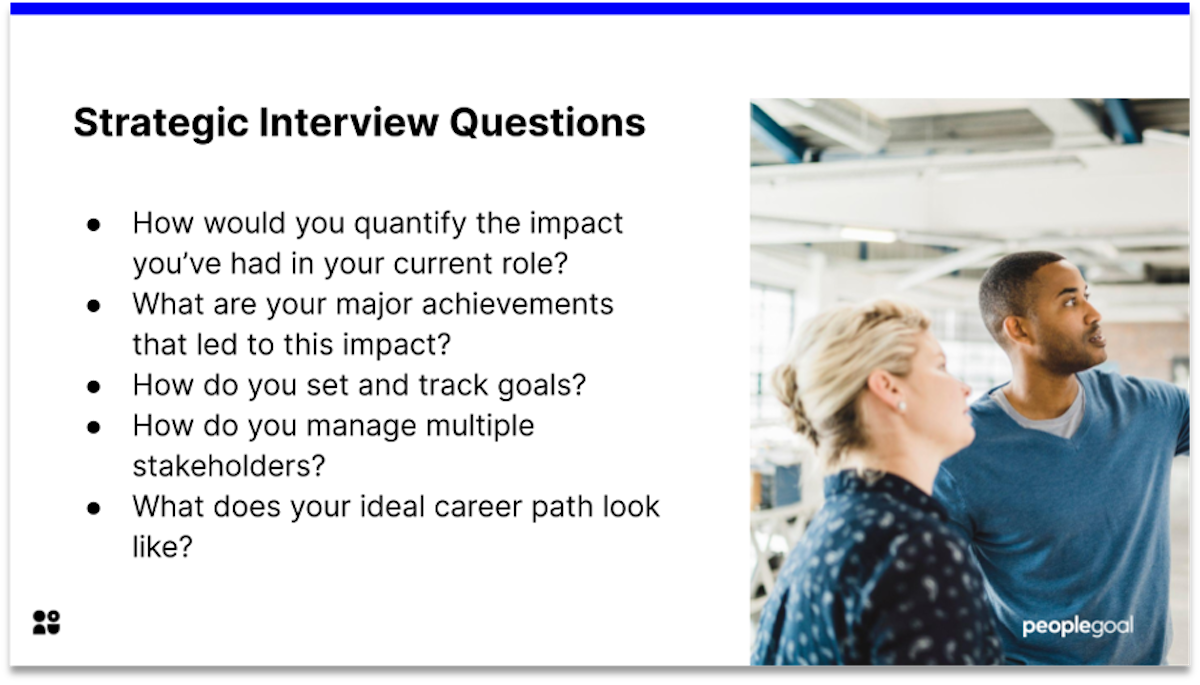
16. How would you quantify the impact you’ve had in your current role?
As it says, what’s the actual impact this person has had in their role? Assess how they’ve contributed directly to the company they work for, and how can they bring meaningful results to your business.
17. What are your major achievements that led to this impact?
Digging deeper into the results, how did they get there? Was it because of their own strategy, planning and delivery? Do they give credit to their collaborators?
18. How do you set and track goals, for yourself and your team?
You’re looking for how aware your candidate is of the business needs and what their management role will bring to your organization. Are they someone who takes accountability for themselves and their team? You also want to assess how they plan out their work and whether they’ll be able to bring strategic ideas and improvements at a leadership level.
19. How do you manage multiple stakeholders?
99% of managers will work cross-functionally: with other managers, colleagues and clients. Being able to manage everyone’s expectations while giving their team the support they need is critical.
20. What does your ideal career path look like?
Is this an ambitious person who you can see growing with your organization? And do they see themselves staying with you long-term? You need to be confident this person has a future at your company, and that you can also give them the coaching and development they need to meet their career goals.
Tips for the Interviewer in a Management Job Interview
Before
Clarify exactly what you’re looking for in this role. You’ll need to meet with multiple stakeholders, and in some cases with the new manager’s team members too. Some of the questions you want to prepare for include:
- Is your business strategically changing and you want an ambitious, creative leader to lead you in a new direction?
- Or are you already growing and bringing on someone new to manage the workload and keep a high-functioning team on a good path?
- What strategic targets will your new manager be responsible for and who will they be accountable to?
- Will they be coming in to manage an established team or building their own team as you grow?
Make sure that you’re steering your interview to learn how the candidate will fit into the company’s ambitions.
During
Screen your candidate for a cultural fit as much as their skills and experience. Someone with the right personality, attitude and ability to learn can be incredibly valuable given the chance and the right resources to succeed.
You also need to be as unbiased as possible in your interview. Be aware of how you phrase questions, and whether you’re unknowingly leading your candidate to answer in a way that you like (or dislike).
After
Go with your gut. If you’re clear on your company’s vision for the future, any nagging doubts you have at the interview stage that aren’t addressed can be incredibly costly later down the line when you need to replace a bad hire. Talk to cross-functional leads about the role and how you felt about the candidate’s interview answers.
Red and Green Flags in the Answers to Manager Interview Questions
✅ Takes responsibility and is accountable for their mistakes and missteps.
🚩 Puts the blame on others and attributes poor results to a lack of time or resources.
✅ Shows a passion for team development, recognizes individual skills and tailors motivation to each individual’s learning style.
🚩 Not interested in coaching and development, prefers to leave team members to their own career plans.
✅ Demonstrates bold ideas and a willingness to try, even if they fail.
🚩 Shows inflexibility, is uncomfortable taking risks and trying a new approach.
✅ Gives realistic answers, acknowledging other contributors.
🚩 Shows arrogance; brags about their individual successes.
✅ Is comfortable having difficult conversations and knows they’re a part of the role.
🚩 Shies away from conflict.
Asking the right manager interview questions will give you a good sense of your candidate and what they can bring to your organization. Remember that it’s all about how this person will fit in with your team and your company’s ambitions, and not necessarily just the person who has all the skills and the most experience. Take a look at our Leadership posts to learn more about what makes a good leader, and what to look for in your next management hire.
Ready to 3x Your Teams' Performance?
Use the best performance management software to align goals, track progress, and boost employee engagement.


